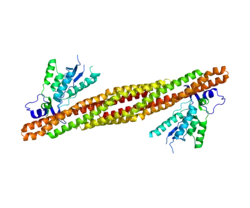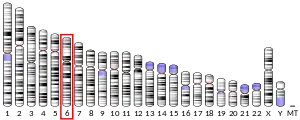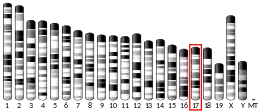Sorting nexin-9 is a protein that in humans is encoded by the SNX9 gene.[5][6][7]
This gene encodes a member of the sorting nexin family. Members of this family contain a phox (PX) domain, which is a phosphoinositide binding domain, and are involved in intracellular trafficking. This protein does not contain a coiled coil region, like some family members, but does contain an SH3 domain near its N-terminus. This protein interacts with the cytoplasmic domains of the precursor but not the processed forms of a disintegrin and metalloprotease domain 9 and 15. This protein binds the beta-appendage domain of adaptor protein 2 and may function to assist adaptor protein 2 in its role at the plasma membrane. This protein interacts with activated Cdc42-associated kinase-2 to regulate the degradation of epidermal growth factor receptor protein.[7]
Interactions
SNX9 has been shown to interact with ADAM9,[5] DNM2[8] and ADAM15.[5]
References
- 1 2 3 GRCh38: Ensembl release 89: ENSG00000130340 - Ensembl, May 2017
- 1 2 3 GRCm38: Ensembl release 89: ENSMUSG00000002365 - Ensembl, May 2017
- ↑ "Human PubMed Reference:". National Center for Biotechnology Information, U.S. National Library of Medicine.
- ↑ "Mouse PubMed Reference:". National Center for Biotechnology Information, U.S. National Library of Medicine.
- 1 2 3 Howard L; Nelson KK; Maciewicz RA; Blobel CP (Dec 1999). "Interaction of the metalloprotease disintegrins MDC9 and MDC15 with two SH3 domain-containing proteins, endophilin I and SH3PX1". J Biol Chem. 274 (44): 31693–9. doi:10.1074/jbc.274.44.31693. PMID 10531379.
- ↑ Yarar D; Waterman-Storer CM; Schmid SL (Jul 2007). "SNX9 couples actin assembly to phosphoinositide signals and is required for membrane remodeling during endocytosis". Dev Cell. 13 (1): 43–56. doi:10.1016/j.devcel.2007.04.014. PMID 17609109.
- 1 2 "Entrez Gene: SNX9 sorting nexin 9".
- ↑ Lundmark, Richard; Carlsson Sven R (Nov 2003). "Sorting nexin 9 participates in clathrin-mediated endocytosis through interactions with the core components". J. Biol. Chem. United States. 278 (47): 46772–81. doi:10.1074/jbc.M307334200. ISSN 0021-9258. PMID 12952949.
Further reading
- Teasdale RD, Loci D, Houghton F, et al. (2001). "A large family of endosome-localized proteins related to sorting nexin 1". Biochem. J. 358 (Pt 1): 7–16. doi:10.1042/0264-6021:3580007. PMC 1222026. PMID 11485546.
- Lin Q; Lo CG; Cerione RA; Yang W (2002). "The Cdc42 target ACK2 interacts with sorting nexin 9 (SH3PX1) to regulate epidermal growth factor receptor degradation". J. Biol. Chem. 277 (12): 10134–8. doi:10.1074/jbc.M110329200. PMID 11799118.
- Lundmark R; Carlsson SR (2002). "The beta-appendages of the four adaptor-protein (AP) complexes: structure and binding properties, and identification of sorting nexin 9 as an accessory protein to AP-2". Biochem. J. 362 (Pt 3): 597–607. doi:10.1042/0264-6021:3620597. PMC 1222423. PMID 11879186.
- Strausberg RL, Feingold EA, Grouse LH, et al. (2003). "Generation and initial analysis of more than 15,000 full-length human and mouse cDNA sequences". Proc. Natl. Acad. Sci. U.S.A. 99 (26): 16899–903. Bibcode:2002PNAS...9916899M. doi:10.1073/pnas.242603899. PMC 139241. PMID 12477932.
- Lundmark R; Carlsson SR (2004). "Sorting nexin 9 participates in clathrin-mediated endocytosis through interactions with the core components". J. Biol. Chem. 278 (47): 46772–81. doi:10.1074/jbc.M307334200. PMID 12952949.
- Mungall AJ, Palmer SA, Sims SK, et al. (2003). "The DNA sequence and analysis of human chromosome 6". Nature. 425 (6960): 805–11. Bibcode:2003Natur.425..805M. doi:10.1038/nature02055. PMID 14574404.
- Schulze WX; Mann M (2004). "A novel proteomic screen for peptide-protein interactions". J. Biol. Chem. 279 (11): 10756–64. doi:10.1074/jbc.M309909200. PMID 14679214.
- Ota T, Suzuki Y, Nishikawa T, et al. (2004). "Complete sequencing and characterization of 21,243 full-length human cDNAs". Nat. Genet. 36 (1): 40–5. doi:10.1038/ng1285. PMID 14702039.
- Lehner B; Sanderson CM (2004). "A protein interaction framework for human mRNA degradation". Genome Res. 14 (7): 1315–23. doi:10.1101/gr.2122004. PMC 442147. PMID 15231747.
- Lundmark R; Carlsson SR (2004). "Regulated membrane recruitment of dynamin-2 mediated by sorting nexin 9". J. Biol. Chem. 279 (41): 42694–702. doi:10.1074/jbc.M407430200. PMID 15299020.
- Gerhard DS, Wagner L, Feingold EA, et al. (2004). "The status, quality, and expansion of the NIH full-length cDNA project: the Mammalian Gene Collection (MGC)". Genome Res. 14 (10B): 2121–7. doi:10.1101/gr.2596504. PMC 528928. PMID 15489334.
- Soulet F; Yarar D; Leonard M; Schmid SL (2005). "SNX9 regulates dynamin assembly and is required for efficient clathrin-mediated endocytosis". Mol. Biol. Cell. 16 (4): 2058–67. doi:10.1091/mbc.E04-11-1016. PMC 1073683. PMID 15703209.
- Yeow-Fong L; Lim L; Manser E (2005). "SNX9 as an adaptor for linking synaptojanin-1 to the Cdc42 effector ACK1". FEBS Lett. 579 (22): 5040–8. doi:10.1016/j.febslet.2005.07.093. PMID 16137687. S2CID 44482842.
- Rual JF, Venkatesan K, Hao T, et al. (2005). "Towards a proteome-scale map of the human protein-protein interaction network". Nature. 437 (7062): 1173–8. Bibcode:2005Natur.437.1173R. doi:10.1038/nature04209. PMID 16189514. S2CID 4427026.
- Childress C; Lin Q; Yang W (2006). "Dimerization is required for SH3PX1 tyrosine phosphorylation in response to epidermal growth factor signalling and interaction with ACK2". Biochem. J. 394 (Pt 3): 693–8. doi:10.1042/BJ20050576. PMC 1383719. PMID 16316319.
- Marchès O, Batchelor M, Shaw RK, et al. (2006). "EspF of enteropathogenic Escherichia coli binds sorting nexin 9". J. Bacteriol. 188 (8): 3110–5. doi:10.1128/JB.188.8.3110-3115.2006. PMC 1447016. PMID 16585770.
- Schmid EM, Ford MG, Burtey A, et al. (2007). "Role of the AP2 beta-appendage hub in recruiting partners for clathrin-coated vesicle assembly". PLOS Biol. 4 (9): e262. doi:10.1371/journal.pbio.0040262. PMC 1540706. PMID 16903783.
- Badour K, McGavin MK, Zhang J, et al. (2007). "Interaction of the Wiskott-Aldrich syndrome protein with sorting nexin 9 is required for CD28 endocytosis and cosignaling in T cells". Proc. Natl. Acad. Sci. U.S.A. 104 (5): 1593–8. Bibcode:2007PNAS..104.1593B. doi:10.1073/pnas.0610543104. PMC 1785243. PMID 17242350.





